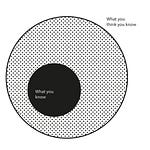Welcome to the (110) new members of The Break since last week! We are all on a mission to break our careers (and that’s a good thing!). Join us to gain the confidence to break out every single week, and pass this along to someone who needs it.
If you like what you’ve been reading follow along on Twitter (@mngardon) and Linkedin for more community and conversations about breaking work.
Today’s Break is brought to you by . . . Top Stack Resume
TopStack Resume writers create custom, ATS-friendly resumes that will wow hiring managers and recruiters. They can also craft engaging cover letters and LinkedIn™ profile content. And, if you need some extra support during your job search, you can work with one of the company’s career consultants for guidance.
Their unique pay-after option allows you to get started with TopStack risk-free.
Both the Professional and the Premium packages come with a 60-day interview guarantee.
How To Network With Anyone On The Internet
Today, I’m going to show you how to network with people you admire on social media, specifically, Linkedin.
Your network determines your level of success - your ability to find a better job, pivot careers or find clients.
The bigger and stronger your online network is, the more likely you are to be successful in whatever endeavor you choose - and the more resilient you become to any change that presents itself.
Unfortunately, almost everyone thinks about their network only when they need something. Networking like this comes from a place of desperate scarcity, short term thinking and self-focus.
This mindset leads to either asking for immediate opportunities without a good relationship built, or a non-specific “can I pick your brain” ask.
Both are destined to get low response rates.
Why?
Because you’re coming to them at one point in time (a dot) and people like to see lines (a series of connected points in time). Relationships are lines, not dots.
Relationships are lines, not dots. They are not about you, and they must be mutually beneficial.
Think about the math behind these approaches.
How likely is it that anyone you need is going to have an opportunity for you at some random point in time? any one day is 0.2% of a full year, so not likely.
Next, busy people being asked for a “brain pick” is a time suck that they are not willing to consider.
As Justin Welsh puts it:
“For example, I have 350,000 followers across LinkedIn and Twitter.
If just 2% of my followers reached out with a brain pick request, I’d have 7,000 DMs, and saying yes to a 15-minute call would mean spending 1,750 hours on Zoom.
I’d have to work 219 consecutive days for 8 hours per day, just doing “brain picks”. Impossible!
That’s why this strategy never, ever works. It’s why you’ll nearly always get ignored by busy people.”
Here’s a better way.
Start by presenting yourself in a clear and compelling fashion
Give people a reason to be interested in you.
The easiest way to do that is to create a clear and compelling linkedin profile. Like it or not, this is the first think people who don’t know you look at to get more information about you.
Here’s a quick cheat sheet:
Banner image: Make it represent who you are.
Headshot: Up to date, professional.
Bio: What can someone expect? Why should they consider meeting you?
About: A description that provides deeper context on who you are as a person and avoids buzzwords like “passionate”.
Featured (LinkedIn): Link to your website or resources that tell people more about you.
Glance over your own social profiles and ask yourself:
“If I came across my own profile, would it be clear what I do, and would I be interesting enough to follow?”
If the answer is no, rework it.
Create a value-driven, long term relationship approach
When you reach out to someone how can you differentiate yourself?
Stop asking what they can do for you, and ask what you can do for them. That’s value.
You need an approach that is focused on providing value upfront without the expectation of immediate return.
Ways to Give Value To Someone You Don’t Know
A relevant, specific compliment: Reach out and tell the person something they’ve done that you specifically enjoy.
If you liked a specific Linkedin post, project, podcast or article, tell them why you liked it, and what impact it had on you.
Bonus: Give them a soft “out” i.e. “No need to reply, just wanted to share how it impacted me”.
Show your support and tag them so they know:
You could write a post about the person, share their content in your newsletter, or figure out what they care about and support that.
Engage with a person’s content on Linkedin. Reply and share, meaningfully.
Introduce them to a meaningful connection: The most powerful way to build a relationship is to connect two people who can help one another.
If you can help someone solve a problem with a connection, you leapfrog hundreds of other people trying to build that relationship.
Here’s a perfect example where I introduced Dave Kline to a web developer and that led to Dave being on my podcast:
If you’re looking for an excellent primer on how to use DMs to build relationships online, read this Tweet thread from Dan Koe.
Give them something, just because.
I use my side hustle, Quotebook, to build relationships when I find out someone I want to connect with has young kids.
Here’s how I did it with Blake Burge who has 300,000+ Twitter followers.
I sent him a Quotebook and we continue to build our relationship on Linkedin.
Regularly follow up
In Blake’s example above, I’ll never ask him to promote Quotebook in any way - that’s not the point.
I followed up to make sure he got it, and now he knows who I am and we regularly interact on Twitter and Linkedin.
I don’t know where this relationship will go, or what we could do together in the future, but I’ve differentiated myself.
Of all of his followers, he knows who I am and what I’m about.
That’s all for today.
What’s happening on the pod?
Here’s a throwback to my interview with Dane Jensen on my favorite topic, RESILIENCE!













